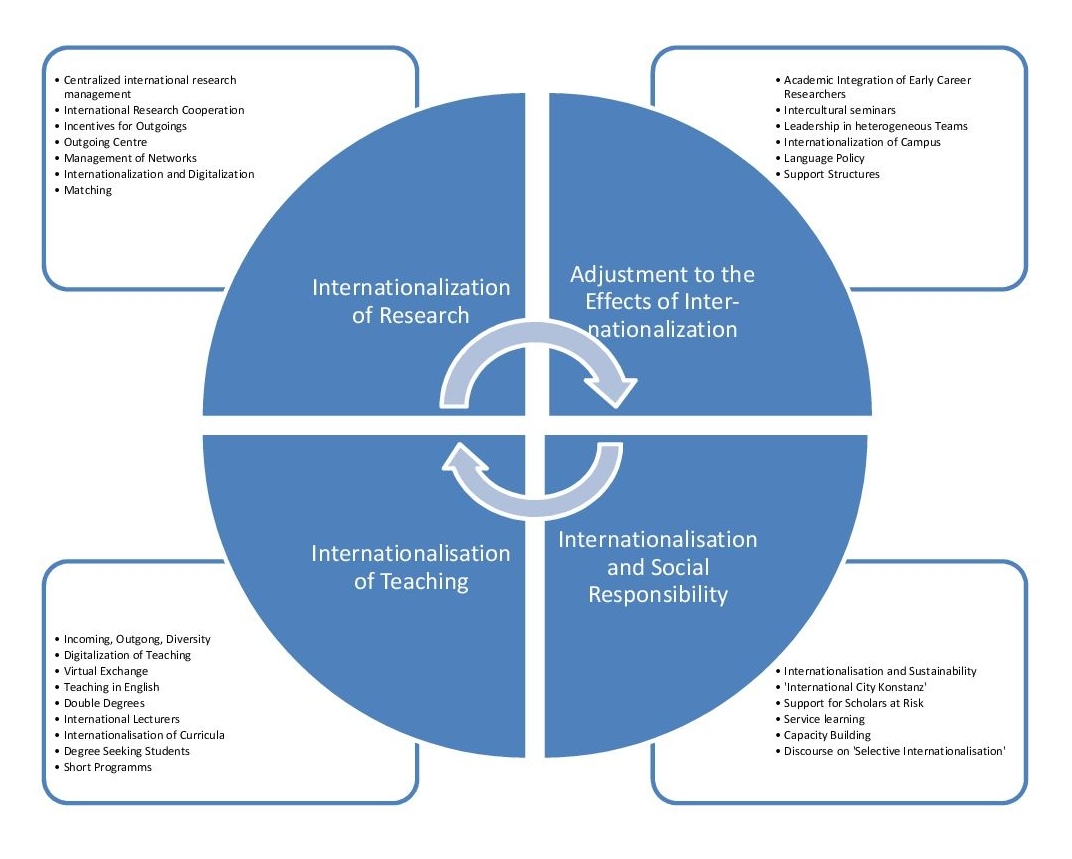
Internationalisation for top research and excellence in teaching
Intensive international contacts and global networking in research and teaching are central to an excellent university
Internationalisation and increasing international visibility have been a major goal of the University of Konstanz for several years. In doing so, the university has already achieved a very high degree of internationalisation at various levels. However, internationalisation is not an end in itself; rather, as a cross-sectoral area, it is a means to an end for certain strategic goals. The comprehensive goal of internationalisation at the University of Konstanz is first of all its integration into the structures of global science, research and teaching in order to ensure the long-term competitiveness of the university in the global context. This implies that internationalisation must be implemented at all levels and in all structural elements of the university. In addition to an internationalisation of teaching as well as science and research, internationalisation also includes administration and support services, an internationalisation of the campus and the university's relations with society.
In order to further develop internationalisation as an important cross-sectoral task, the University of Konstanz has the following goals:
- To further increase the international visibility of the university
- To further increase the number of outgoing and incoming students
- To further expand the internationalisation of science and research at the institutional level
- To adapt the university structures more strongly to the effects of internationalisation
- Shaping internationalisation as a social responsibility
- Internationalisation and digitalisation
The University of Konstanz already has a high degree of internationalisation in study and teaching (e.g. 44% of graduates have study-related international experience) and comprehensive incentive structures for student mobility, an extensive network of international partner cooperations, excellent support structures (for outgoing, incoming, degree-seeking students), an excellent Welcome Centre (for international reseachers), experience in international networks (e.g. YERUN) and researchers with excellent international networks. Furthermore, the University of Konstanz is member of the 'European Reform University Alliance' (ERUA).
Based on this, internationalisation will be further expanded in the following four areas:
Internationalisation of Teaching
- Increasing outgoing mobility
- Increasing incoming mobility
- Double degree programmes and joint PhD programmes
- Internationalisation of curricula
- Expansion of teaching in foreign languages
- Digital formats (virtual exchange, virtual guest lectureships, pooling of virtual seminars for incoming and outgoing students)
- Flexible mobility options such as short programmes (summer schools, research internships, service learning, virtual modules)
- Recruitment of international degree seeking students
- Further internationalisation of teacher training programmes
Internationalisation of Research
- International networks, e.g. YERUN
- Strategic cooperation in research
- Systematic support of international research cooperations
- Increasing international mobility of early career researchers and established researchers
- Outgoing Centre to support international mobility of researchers
Adjustment to the Effects of Inter-nationalization
The University of Konstanz does already have a high international diversity of students, researchers and administrative staff. Therefore, the university has to adjust its structures in order to respond to the effects of internationalisation.
- Internationalisation of the campus
- Expansion of support structures
- Language policy
- Seminars on intercultural communication at various levels
- Seminars on leadership in heterogeneous teams
- Reflection on different academic systems
Internationalisation and Social Responsibility
Excellent science is located in a social context. Thus, science, research and teaching have an impact on society and imply social responsibility. This is also reflected in the University of Konstanz's broad understanding of transfer. The social responsibility of the University of Konstanz has significant implications for internationalisation. The following aspects will be considered in the area of internationalisation and social responsibility.
- Internationalisation and sustainability
- Cooperation with the city of Konstanz in the "International City of Konstanz" project
- Capacity Building
- Support for scholars at risk and students
- Service learning and international community projects
- Expansion of internationalisation in various regions (discourse on 'selective internationalisation')

